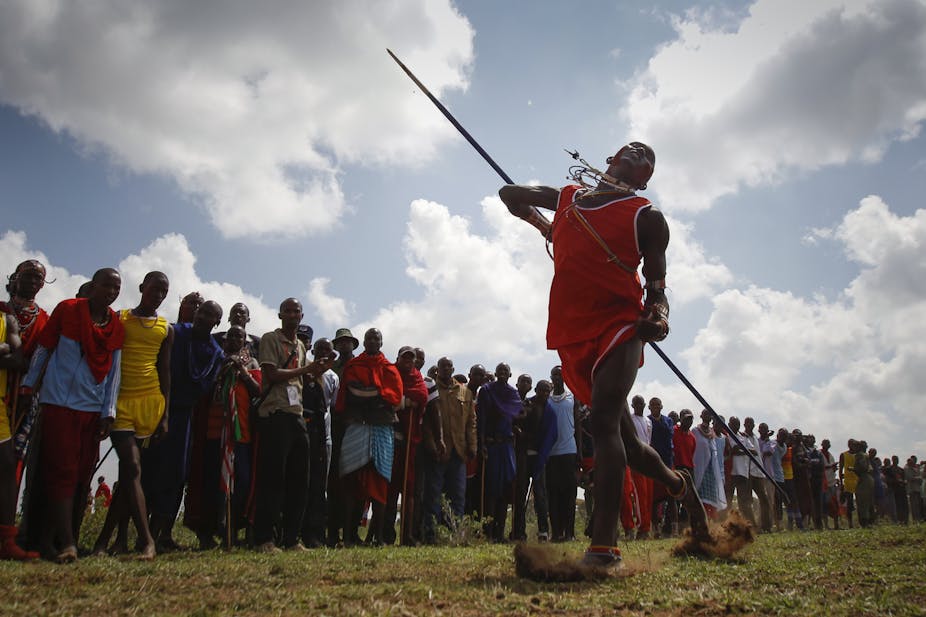Making something illegal will not stop it happening – just look at the trade in endangered animal parts in traditional Chinese medicine. And in some cases making an activity illegal has made it more desirable, the consumption of bush meat in Africa being a case in point. The forbidden fruit, or in this case monkey, tastes sweeter.
It’s clear that any crackdown on illicit activity needs to address motivations. Foxhunting is a great example. Ten years after hunting with dogs was outlawed in the UK, prime minister David Cameron has promised MPs an open vote on repealing the ban if he wins the general election. Though 80% of England’s population is against it, clearly the rest still want to carry on as before.
Perhaps what fox hunting diehards need is an alternative. Not something that simply exists to keep the authorities happy, but a competitive alternative in its own right. Maybe they could look to east Africa for inspiration, where the Maasai people have traded lion hunting for a different sort of competitive thrill-seeking.
Cultural killing
Addressing fox hunting requires an understanding of its causes. Politics aside, the question is why there is still such a desire to chase and kill foxes with hounds. Fox populations have not exploded since the ban, so there is no argument in terms of pest control. And in any case lamping – the dazzling of a fox with a bright light and then shooting it – when carried out by a trained marksman has been shown to be a much more effective and humane method of control.

Fox hunting enthusiasts argue it is part of the nation’s cultural heritage and that the ban is eroding the culture of countryside folk. This argument is used by indigenous people to hunt everything from polar bears to dugongs or whales. Fox hunters are quick to point out their target is officially classified as a pest not an endangered species.
But culture changes, people say, and fox hunting need not be part of the UK’s social life for ever. Child labour, for instance, was an important part of the industrial revolution in the UK – it’s now long banned, and no one wants to bring back the traditional chimney sweep.
The fox hunting lobby isn’t buying into the argument that culture moves on. They point out that the number of hunts is still the same as before the ban. Of course since the ban they have been able to engage in substitute activities such as trail hunting, the laying down and following of an artificial trail in the pattern that a fox would leave across appropriate terrain. Thus the hunters have had outlets for their desires.
Many people accept that their motivations to hunt are no longer appropriate in a modern society where food is easily available. Fishermen practice catch and release, and hunters can shoot clay pigeons.
These activities have been turned into games: fishermen can compete in matches or at least tell their tales of the one who got away, whereas clay pigeon shooting is featured in the Olympics.
Pride, prizes and prestige can be gained in these sports. Something that is missing I suspect from trail hunting, which is born out of a stigmatised activity that now has no obvious prize. In the past, hunts could boast of how many kills they had made in a season.
Cultures can change
Lions in Africa are another species that soon could be on the endangered species list. Realising this, the Maasai of Kenya and Tanzania have changed one important part of their cultural heritage. Traditionally for a man to become a warrior, a leader or at least attract a wife, he needed to go out and kill a lion. Since 2012 the Maasai have substituted killing lions with the Maasai Olympics where they can run, jump and throw against each other.
The winners gain medals, prizes and prestige – the same honours once gained through lion-killing. This shows culture is not a static thing but it evolves in relation to its environment. If culture does not evolve then as all things suffering Darwinian forces it will go extinct – the Maasai know this.
Maasai men have been killing lions for much longer than people in the UK have been hunting foxes with hounds but have quickly accepted a change in their culture. Those wishing to repeal the Hunting Act would do well to think about the lessons to be learned from the Maasai. Even cultural conservation is not preservation – it is about adapting to change in your environment and acting sustainably.

